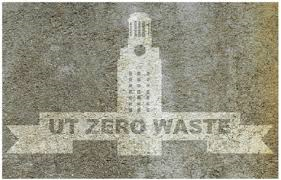
The University has a goal to demonstrate leadership in both the reduction and diversion of waste with anticipated outcomes including achieving Zero Waste and reducing per-capita waste generation.
Zero Waste Strategies
- Right-size solid waste and recycling infrastructure
- Develop reuse/recycle programs for special and/or not readily recyclable materials
- Develop programs to encourage highest and best use of materials
- Convert major campus events to zero waste
- Expand food waste avoidance, donation programs and organics diversion campus-wide
- Promote UT Austin as a national model for waste diversion for a research university
- Reduce hazardous waste generation
Current and Past Initiatives

2025
- University Housing and Dining’s dining halls use compostable and reusable serving materials exclusively.
- The Campus Computer Store becomes an on-campus e-waste recycling collection location for personal property, initially launching as part of Trash to Treasure dorm moveout waste diversion.
- Green Labs staff and Dr. Alexandra Clarà Saracho, Assistant Professor in the Maseeh Department of Civil, Architectural and Environmental Engineering, launch U-share-iT, a lab equipment and instrument redistribution and sharing platform for UT researchers.
- University Housing and Dining received a Green Fund Grant to establish a composting program for certain Longhorn Hospitality events. All UHD signature events are zero waste and all serviceware is compostable.
- UT Free Food launches to address campus food insecurity and reduce food waste. Developed by MyUT and Resource Recovery.
- Green Labs launches an online surplus lab glassware inventory where researchers can request free lab glassware.
- Zero Waste Building System program pilot at Moody College buildings DMC, CMA, and CMB. This program updates the indoor waste bin system for the future by matching waste bin needs to building space use and centralizing waste stations. Custodial Services estimates a 30% reduction in bags per month in the pilot buildings, clearer hallways, and improved staff workloading.
- Custodial Services begins using reusable bags for linen washing.
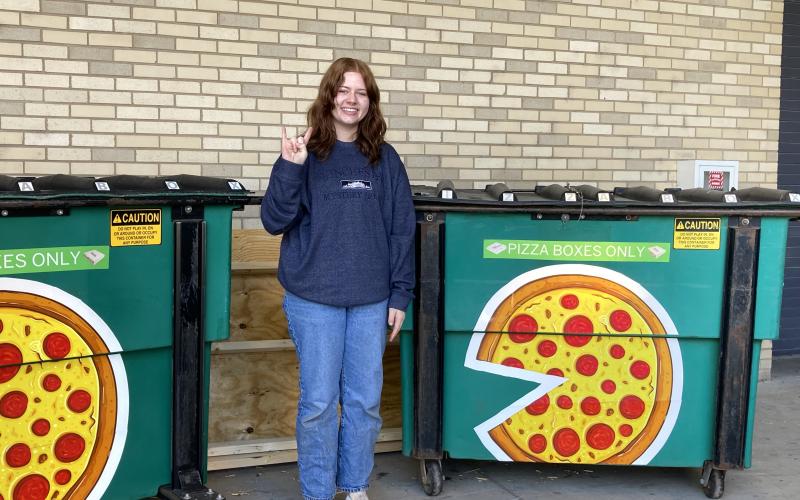
2024
- Green Labs staff and Dr. Alexandra Clarà Saracho, Assistant Professor in the Maseeh Department of Civil, Architectural and Environmental Engineering, receive a Green Fund grant to create and pilot U-share-iT, a lab equipment and instrument redistribution and sharing platform for UT researchers.
- University Housing and Dining’s Grounds for Grounds program expanded coffee grounds compost collection in partnership with Campus Grounds and Landscape. Grounds and Landscape collected 24,700 pounds of coffee grounds and creates compost that is used in greenhouse operations and for planting on campus.
- Resource Recovery begins offering compost liners to offices for the composting of shredded paper.
- Resource Recovery sorts an entire truckload of campus compost and determines that campus is managing compost programs well. The audit found that less than 1% of contents are contaminants.
- Resource Recovery and Custodial Services pilot pizza box composting at ETC with Green Fund support. The program also improves pizza box management for Custodial Services. Extended to EER in 2025.
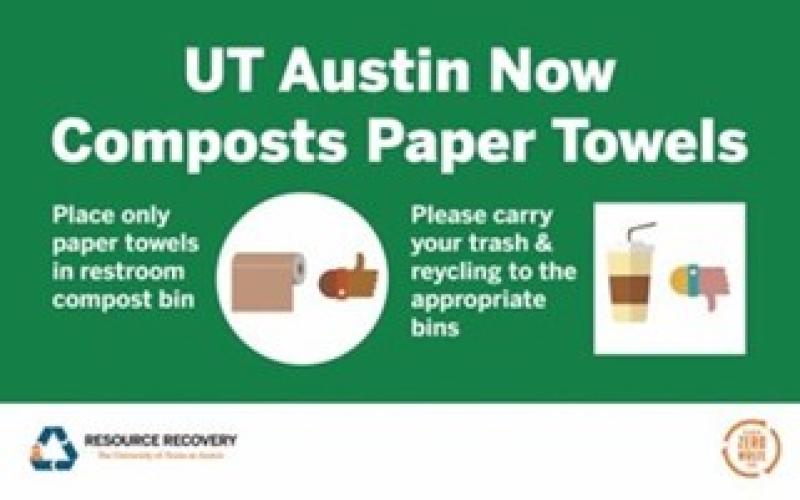
2023
- Green Labs expands their Styrofoam, cold pack, and plastic film recycling collections to the Health Discovery Building.
- Green Labs launches the EHS Green Labs Leader badge, a self-paced certification program that provides UT student researchers with opportunities to learn about lab sustainability, including how to reduce waste from their lab.
- Restroom paper towel composting rollout complete across Education & General (academic) buildings.
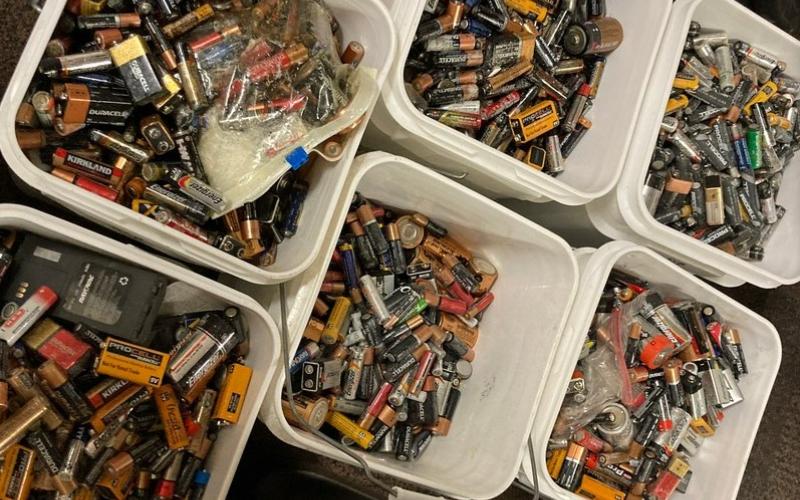
2022
- Green Events begins offering weekly drop-offs for campus composting.
- Resource Recovery launches single-use alkaline battery recycling collections once per term.
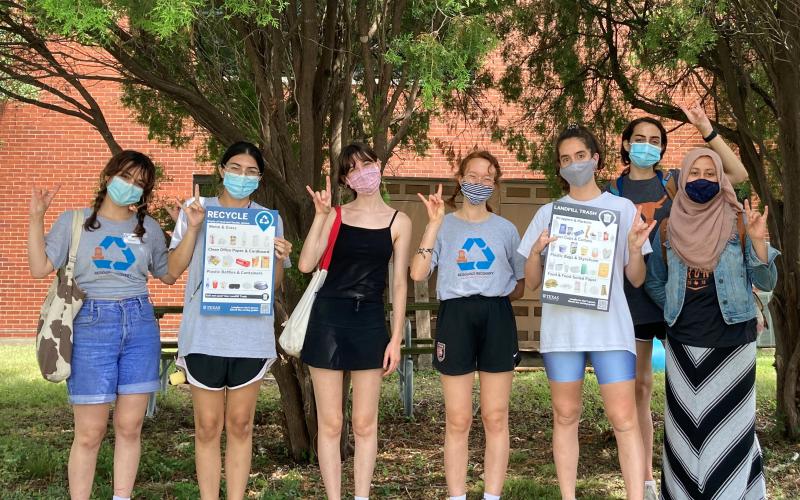
2021
- Resource Recovery partners with University Housing and Dining, Office of Sustainability, and University Unions to design updated waste bin signage. Standardized recycling and landfill trash signage posted across 127 E&G buildings on Main Campus and the JJ Pickle Research Campus.
- “What Do I Do With This?” Zero Waste Sorting Database launched.
- Expanded restroom paper towel composting to 60 general use campus buildings.
- Staff Council, Office of Sustainability, and Resource Recovery collaborate to launch the UT Catering and Food Vendor Sustainability Database.
- Zero Waste Events team launches the ZWEco Supply Store, where staff and faculty event planners can purchase BPI-certified compostable serviceware, reserve compost bins, and request zero waste staffing for their event.
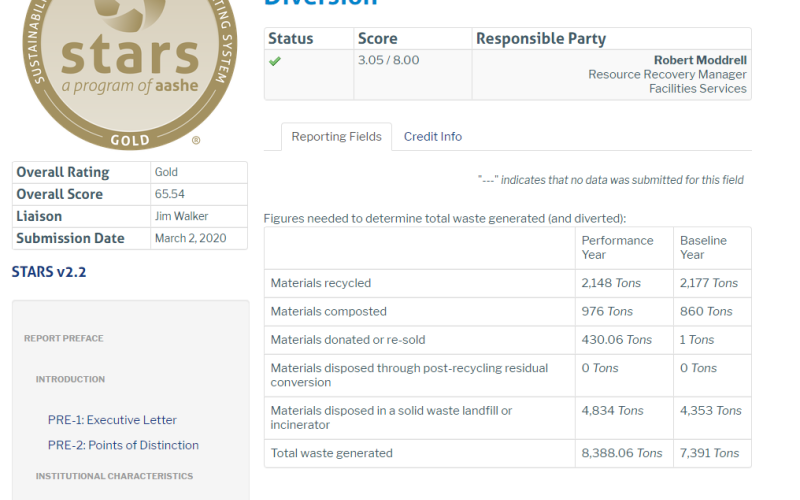
2020
- UT achieves AASHE STARS Gold.
- Forty Acres Pharmacy reduces paper waste by linking to medication information.
- UT Surplus Reuse Store achieves 92% diversion from the landfill.
- Green Labs hosts the first Lab Supply Swap, rehoming over 450 lbs. of lab items.
- Trash to Treasure launches the Making Amends initiative which allows students to upcycle clothing and reduce textile waste.
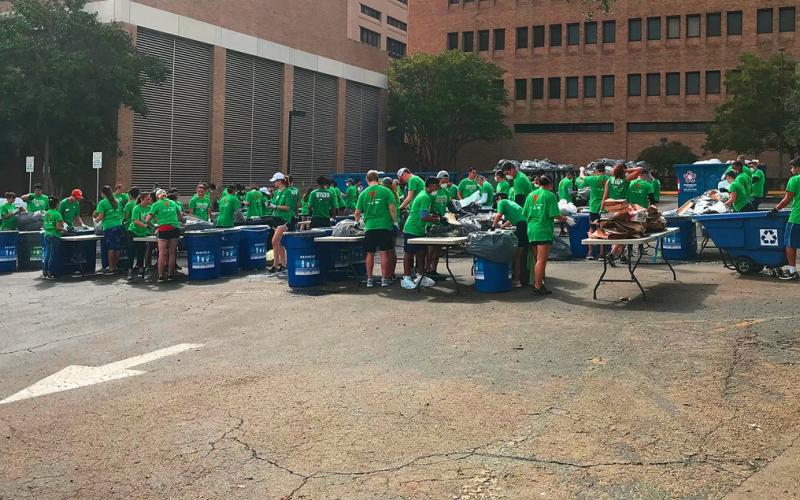
2019
- J.R. 19 (S) 3 - Endorsement of UT Sustainability Master Plan and Goal of Zero Waste Campus by 2020.
- Zero Waste Events intern team begins providing personalized event support.
- First Zero Waste Gone to Texas satellite event: Gone to Engineering.
- Zero Waste Hero certification program launches.
- Resource Recovery presented with Helping Hand Tower Award for its role as a community partner with ProjectLEAD.
- UT begins hauling its own compost. The inaugural year included vivariums, academic buildings, Unions, and UT Elementary.
- Texas Athletics named Green Sports Alliance Environmental Innovators of the Year for the second year in a row.
- Zero Waste Workplace reaches over 1 million square feet of academic building space.
- Green Labs moves under Environmental Health & Safety (EHS) and hires a full-time coordinator.
- Landscape Services has composted leaves for at least 20 years and invests in enhanced compost quality with new leaf vacuum/mulching and screening machines. The compost product is used in shrub and annual flower beds and greenhouse potting media.
- The Office of Sustainability’s annual Office Supply Swap begins as a reuse initiative that redistributes gently used office supplies collected from across campus to promote reuse among faculty and staff across all departments.
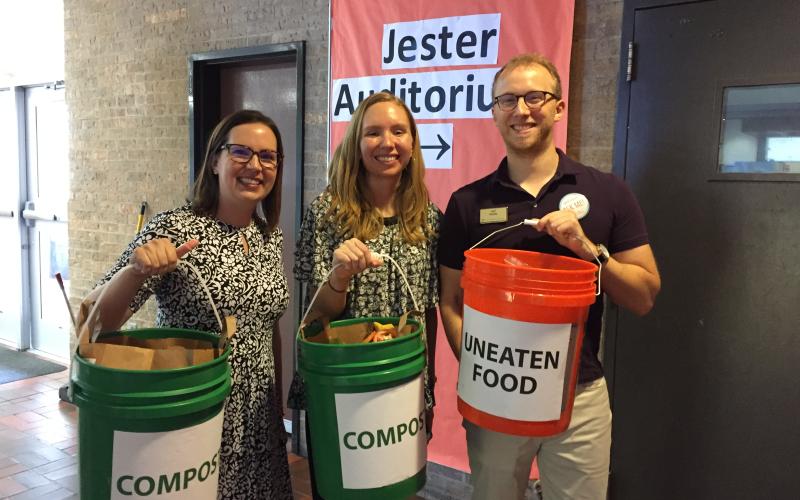
2018
- Student Government creates Sustainability Policy Director positions.
- Orientation lunch diversion program launched in partnership with New Student Services.
- Zero Waste Workplace for academic buildings including interior bin pairing, restroom paper towel composting, and break room composting opportunities first roll-out at the Student Services Building.
- Surplus REuse Store becomes weekly following pilot event sales.
- Texas Athletics hosts first zero waste baseball season in NCAA Division 1 history and receives Green Sports Alliance Environmental Innovators of the Year Award.
- Austin Resource Recovery launches Move Out ATX for student off-campus move-out.
- Over 50 different student organizations volunteer during home football game sorts and football reaches a 75% game diversion rate.
- University Housing and Dining adds battery recycling containers to the residence halls.
2017
- Resource Recovery student interns test and organize outdated university computer peripherals and lab equipment at Surplus Property to assess reuse opportunities.
- In stewardship of the SITES certified Dell Medical District, Landscape Services collects used coffee grounds from campus vendors to incorporate into the production of compost tea to feed campus plants and trees.
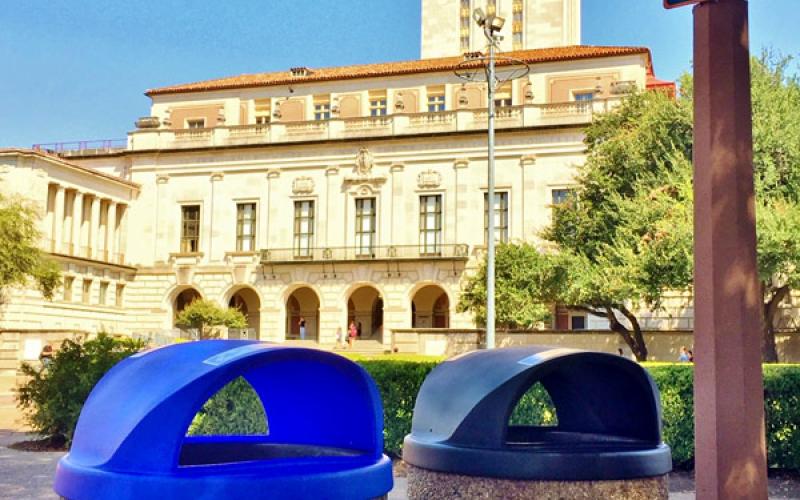
2016
- First-ever UT Austin Sustainability Master Plan signed under President Gregory Fenves.
- Outdoor recycling and landfill trash bin infrastructure relocated, paired, and labeled enhancing recycling collection capacity.
- SG AR 18 - In Support of Improved Composting on Campus.
- Resource Recovery Student Internship program first cohort.
- Green Offices program launched.
2015
- UT becomes the second university in the country where its Chick-fil-A restaurants on campus switch to compostable cups instead of polystyrene.
- Texas Athletics initiates football waste audits and waste sorts and consults with concessionaire to simplify the kinds of packaging materials coming into their facilities.
- The School of Architecture opens the Material Exchange to reuse studio project materials.
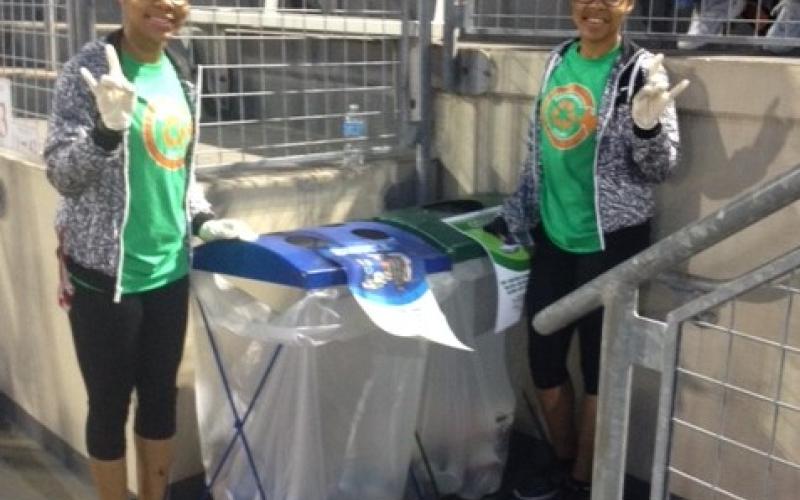
2014
- First Texas Athletics zero waste softball series.
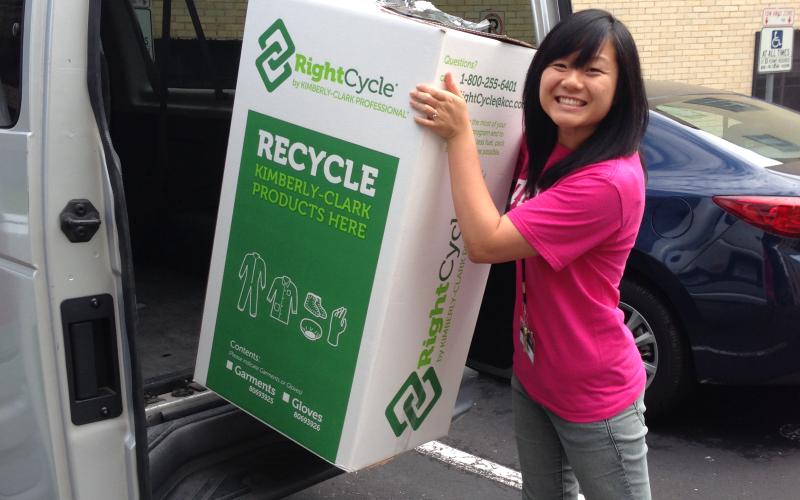
2013
- UT's recycling collection moves to single-stream collection and begins accepting glass products.
- Green Greeks begins working to make Greek life more sustainable, including events and cleanup recycling.
- University Health Services is awarded a Green Fund grant and over the next several years pilots and launches recycling and composting in their medical clinics.
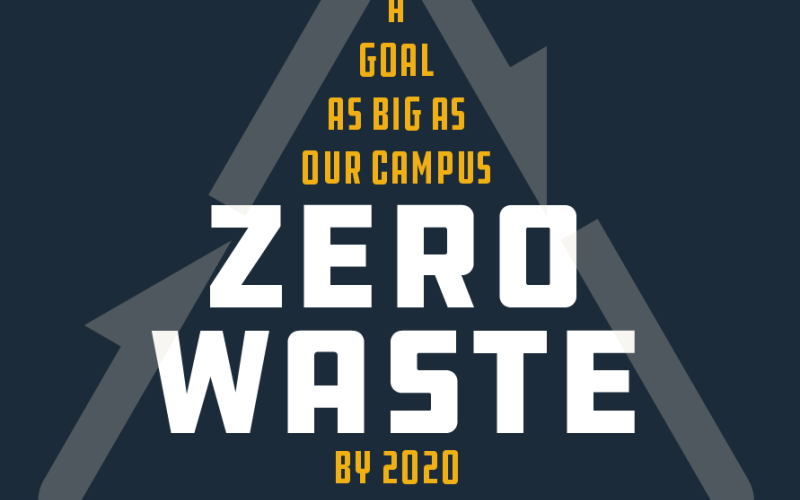
2012
- The Natural Resources Conservation Plan was adopted, which included setting the Zero Waste goal and the creation of the new Resource Recovery unit.
- Green Events program starts.
- Landscape Services initiates milling of campus lumber for special projects such as frames and building furniture found at SSB, EER, NUR, and DMS.
- Landscape Services begins processing 20-50 yards per year of tree debris into single-grind mulch to apply to bed and tree rings across campus.
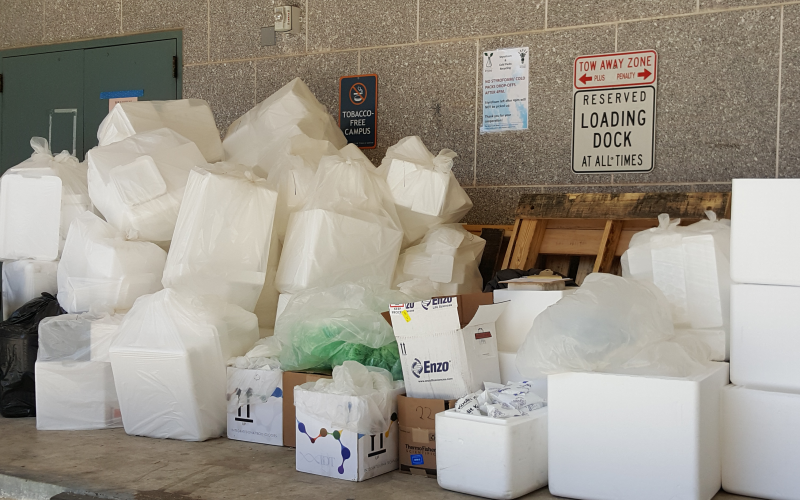
2011
- Green Labs program begins.
- Becoming a reality after year of capacity-building by students, Green Fund begins supporting sustainability initiatives and research projects on campus, including many zero waste and recycling projects.
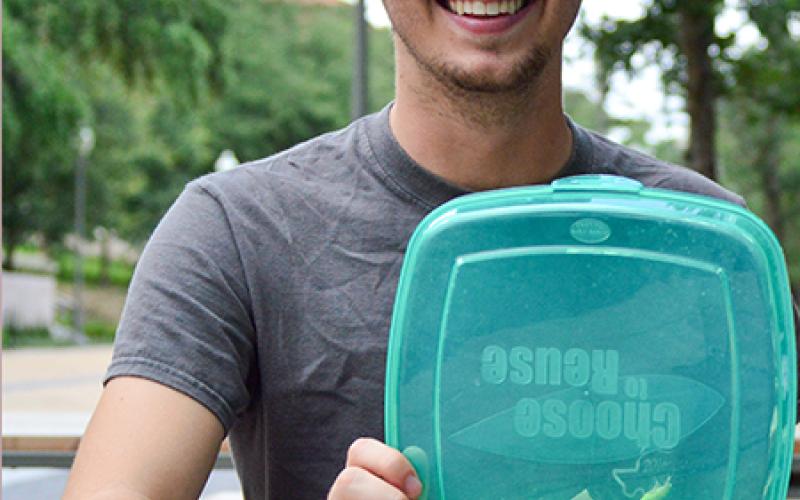
2010
- Eco2Go reusable to-go containers initiated by University Housing and Dining, saving 3.15 tons of disposables from the landfill in the first year.
- Office of Sustainability created.
- Longhorn Recycling Roundup launches with a student volunteer Tailgate Recycling Crew, handing out plastic bags to sort recyclables and non-recyclables to tailgaters at football home games, and collecting recyclables at the stadium gates. Additionally, a compost station was set up in the North End Zone food court.
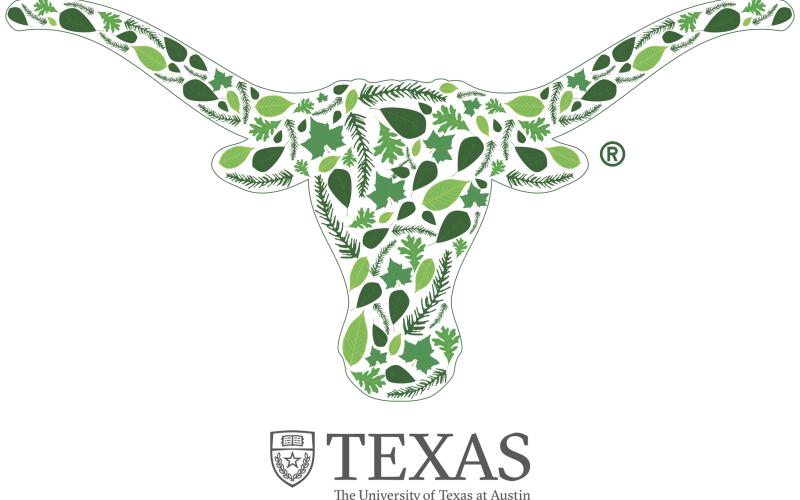
2008
- Sustainability Steering Committee develops the first UT Austin Campus Sustainability Policy, which was then adopted by President Powers.
- First University Housing and Dining plate waste study is conducted to study the effect of eliminating trays and reveals that one change resulted in food waste being cut in half.
- University Housing and Dining begins composting food waste.
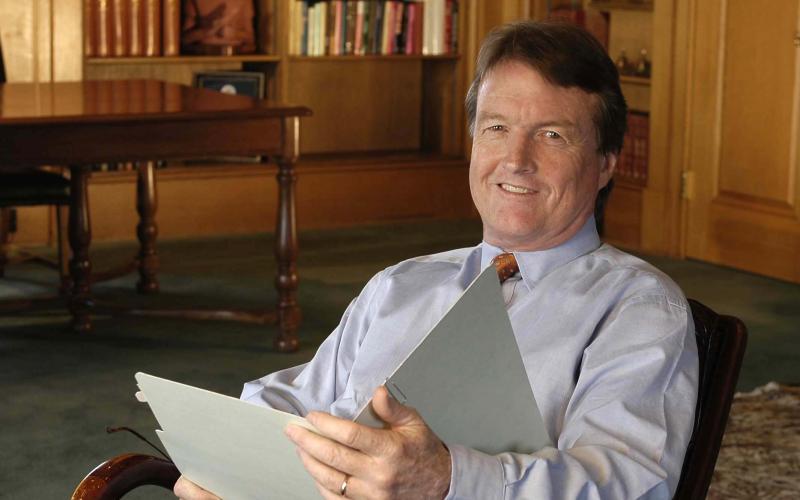
2007
- President William Powers appoints the first UT Austin Sustainability Steering Committee comprised of faculty, administrators, staff, and student representatives as a forum for an ongoing discussion about sustainability.
- The Campus Environmental Center hires their first part-time student coordinator to oversee recycling efforts on campus.
2006
- The Campus Environmental Center's Recycling Task Force partners with UT's Facilities Services to expand its efforts to increase material types collected, recycling awareness, and the number of volunteer staff.
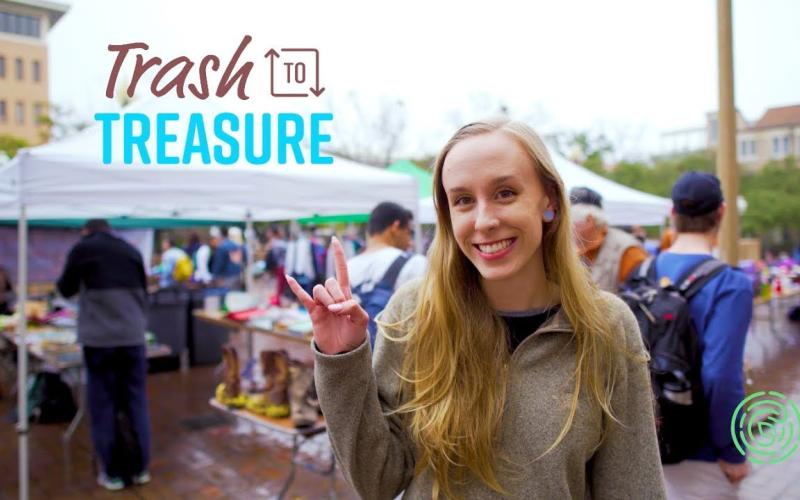
2005
- Trash to Treasure program starts.
- The Campus Environmental Center runs an ink cartridge recycling program, which is later run by Document Solutions.
- Recycling Task Force members conduct a waste audit of 1,300 pounds of campus waste to determine the portion of recyclable content.
- CAN'EM, a project run by UT Police Department and partners, collects aluminum cans from home game tailgating.
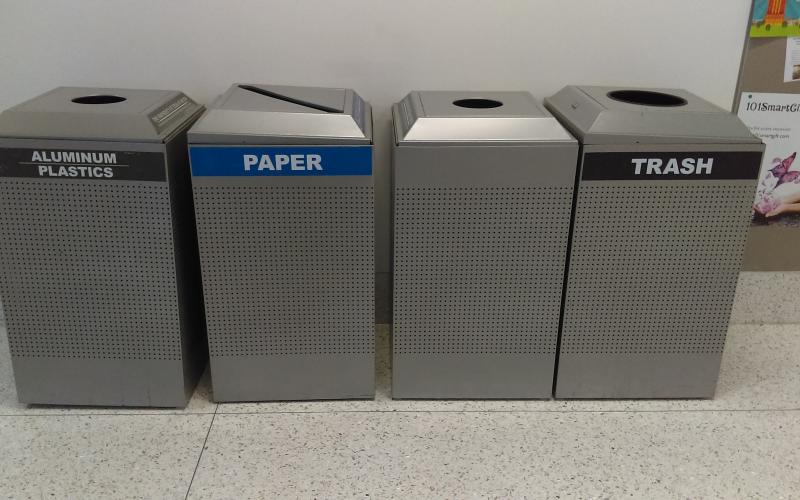
2003
- Student-run Recycling Task Force effort places and services 12 recycling bins around campus to recycle aluminum, glass, and plastic to expand upon the university's paper recycling.
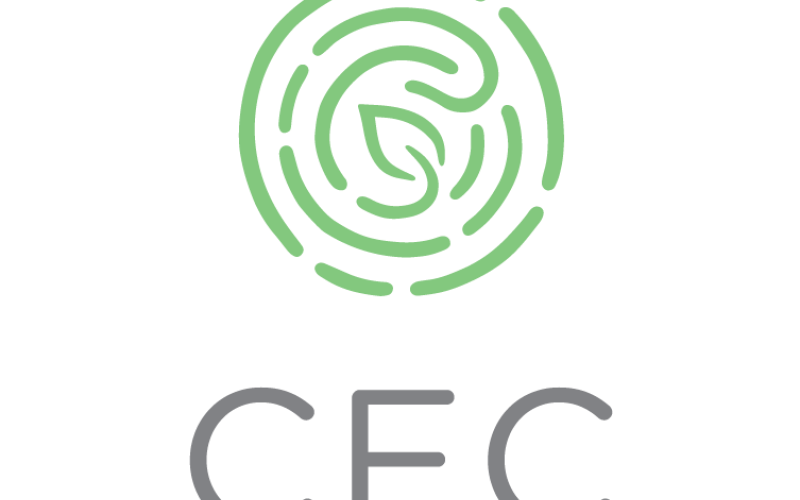
2002
- An effort to improve UT's collection of recyclables leads to the creation of a Recycling Task Force, an off-shoot of student government and a coalition of campus environmentally-minded organizations and students that would later become the Campus Environmental Center and lead to the eventual institutionalization of recycling by Facilities Services.

1999
- UT Recycling Program receives Best Comprehensive Program Award by the Austin Corporate Recycling Council, 1999 Environmental Vision Award, and Recycler of the Year from the Texas Natural Resource Conservation (year unknown).
- The UT program recycles all types of paper as well as industrial products like antifreeze, oil, freon, batteries, and scrap metal.
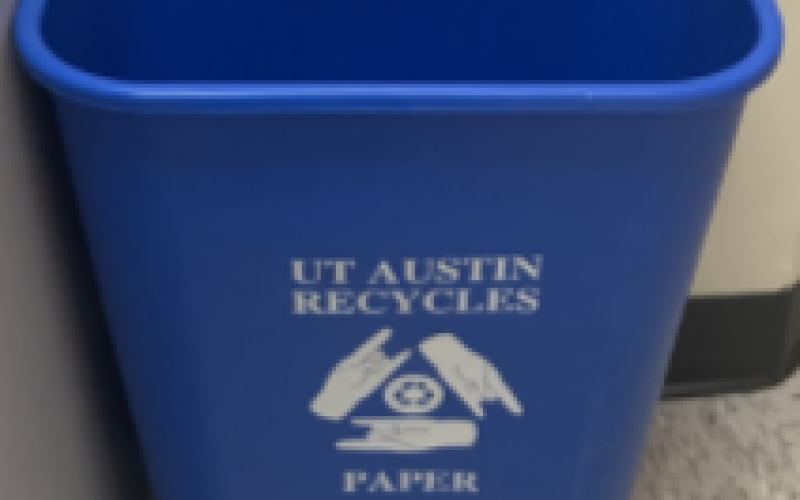
1998
- Largely through student effort, the Division of Housing and Food Service (now University Housing and Dining) puts a recycling bin in every dorm room.
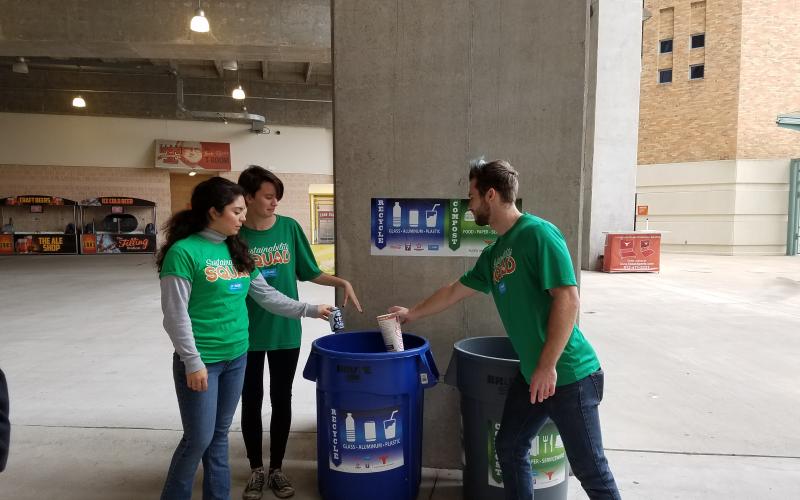
1996
- Longhorns Recycling Roundup begins challenging Texas fans to recycle cups at Texas Athletics facilities.
1995
- UT Recycling Advisory Committee announces the creation of a recycling coordinator position.
- 60% of UT's total waste in 1995 is paper.
- UT begins considering increased loading dock space to ensure the future design of UT buildings will be receptive to recycling.
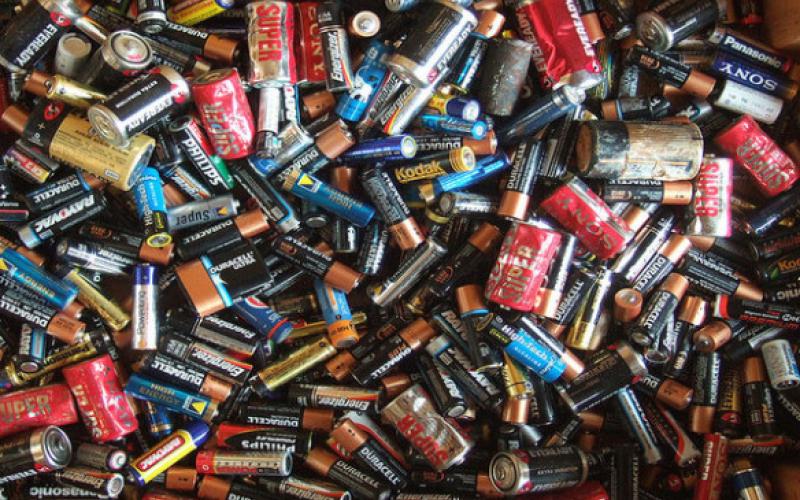
1994
- Recycling Advisory Committee is formed by UT President Robert Berdahl to advise him on recycling issues and "assist in making the university a model of environmental awareness and action."
- UT alumnus Kevin Tuerff (B.S. '88) co-creates Texas Recycles Day, which later becomes the nationally recognized America Recycles Day.
- UT has been recycling other products such as batteries and tires "for some time."
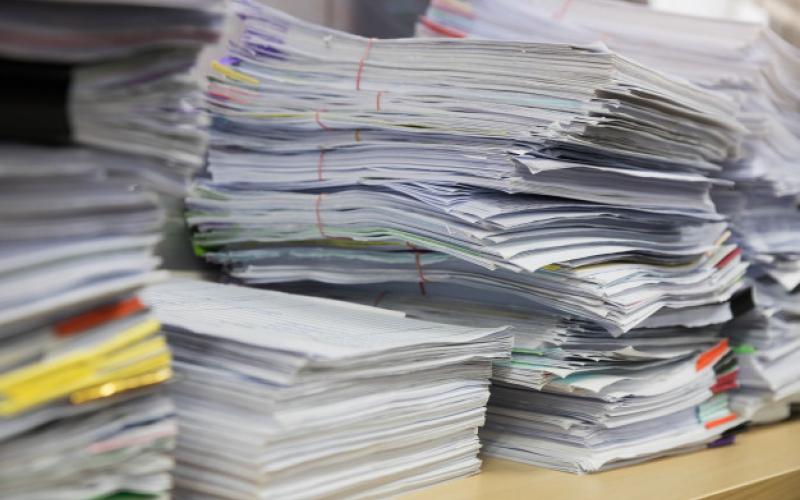
1993
- UT Physical Plant begins a paper recycling program.
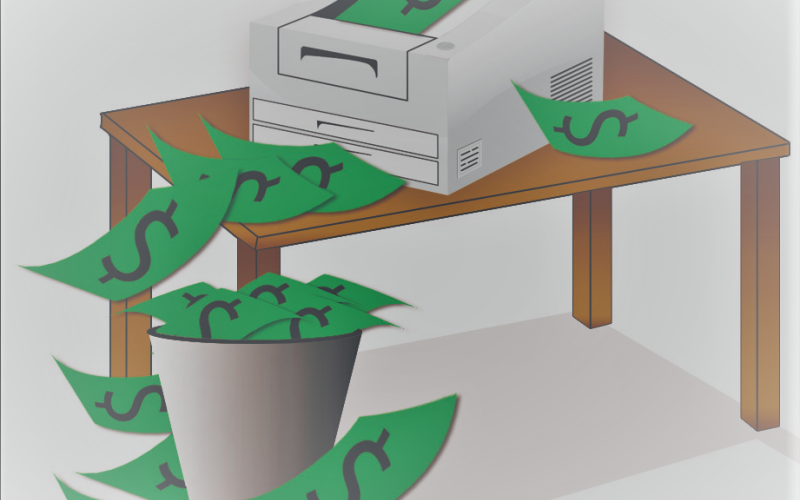
1992
- Campus Environmental Committee recommends to President William Cunningham funding and approval to 1) start recycling cardboard and paper with a plan to phase in more materials later and 2) to reduce the overall amount of paper used.
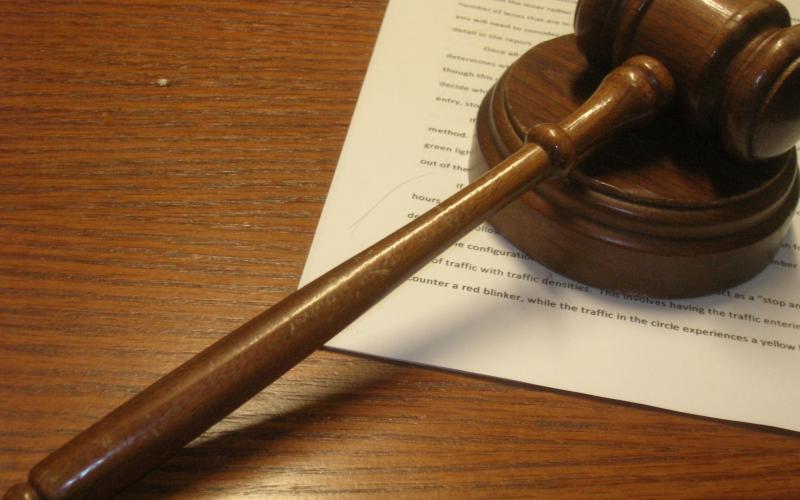
1991
- The State of Texas legislature amended the Texas Health and Safety code with S.B. 1340, which codified the state's recycling policy including the requirement of all state agencies to recycle.
- In response to S.B. 1340 and petitions signed by 1,000 students, faculty and staff requesting a campus-wide recycling policy, the university forms an ad hoc Campus Environmental Committee to study 1) campus recycling and source reduction and 2) campus beautification.
- Student-led efforts initiate and manage recycling at UT with limited collection containers.



